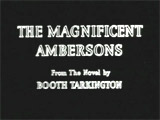
|
The Magnificent
Ambersons (1942)
In director Orson Welles' period drama, with impressive
photography and innovative cinematic techniques, about the demise
of the Amberson family due to the oncoming industrial revolution:
- the opening voice-over narration (Orson Welles)
sequence demonstrating the changing styles and fashions: ("The
magnificence of the Ambersons began in 1873. Their splendor lasted
throughout all the years that saw their Midland town spread and
darken into a city. In that town in those days, all the women who
wore silk or velvet knew all the other women who wore silk or velvet
and everybody knew everybody else's family horse and carriage.
The only public conveyance was the streetcar. A lady could whistle
to it from an upstairs window, and the car would halt at once,
and wait for her, while she shut the window ... put on her hat
and coat ... went downstairs... found an umbrella... told the 'girl'
what to have for dinner...and came forth from the house. Too slow
for us nowadays, because the faster we're carried, the less time
we have to spare") - with the narrator's ultimate conclusion:
"Against so homespun a background, the magnificence of the Ambersons
was as conspicuous as a brass band at a funeral"
- the views of the great Amberson mansion, a convincing,
turn-of-the-century re-creation, inhabited by the richest family
in the town: (voice-over: "There it is, the Amberson mansion.
The pride of the town...Sixty thousands dollars worth of woodwork
alone. Hot and cold running water, upstairs and down. And stationary
washstands in every last bedroom in the place")
- the introduction of young George Minafer (Bobby Cooper
as boy) ("George Amberson Minafer, the Major's one grandchild,
was a princely terror") - the offspring of dull, pallid, colorless
and passionless Wilbur Minafer (Don Dillaway) and beautiful Isabel
Amberson (Dolores Costello), the only daughter of Major Amberson
(Richard Bennett); the boy was a spoiled, insufferable, hateful,
daredevil brat dressed in velveteen and with golden ringlets in his
hair; he was seen riding recklessly through town in a tiny carriage,
whipping his buggy pony; careening by, he upset a gardener with a
hoe; although indulged and adored by his mother, everyone in town
longed to see George receive his ultimate "come-uppance":
"They did hope to live to see the day, they said, when that boy
would get his come-uppance"
- the courtship between George Minafer (Tim Holt as
adult) and Lucy Morgan (Anne Baxter), when George first encountered
her father, automobile entrepreneur and widower Eugene Morgan (Joseph
Cotten), who was dancing in the mansion dancing Aunt Fanny (Agnes
Moorehead), Wilbur Minafer's unmarried, shrill-voiced sister; George
insultingly called Eugene "a queer looking duck" before
actually meeting him
- their sleigh-riding sequence in winter-time, when
the couple were seen whirling along in a horse-drawn sleigh, passing
Eugene's stalled vehicle and calling out: "Get a horse!" but
then their sleigh carriage tipped over, and dropped them into the
snow where they were seen sneaking a kiss with each other; at the
end of the sequence, as Eugene drove away from the snowy scene in
his experimental car, the camera slowly irised-out on the car [a
tribute to older silent films], turning the screen black
- the dining room table sequence in which Eugene Morgan
elegantly and beautifully delivered a very significant speech, philosophizing
about the growth of the new invention: the automobile - and admitting
the possible consequences of the new industrial revolution: ("With
all their speed forward, they may be a step backward in civilization.
It may be that they won't add to the beauty of the world or the life
of men's souls. I'm not sure. But automobiles have come. And almost
all outward things are going to be different because of what they
bring. They're going to alter war and they're going to alter peace.
And I think men's minds are going to be changed in subtle ways because
of automobiles. And it may be that George is right. It may be that
in ten or twenty years from now, if we can see the inward change
in men by that time, I shouldn't be able to defend the gasoline engine
but would have to agree with George: that automobiles had no business
to be invented"); before the speech George insultingly despised
automobiles as a "useless nuisance"
- the revealing conversation of self-pitying and gossipy
Aunt Fanny and George on different landings of the Amberson's circular
staircase, with each successive landing of the staircase featuring
stained-glass windows that were labeled
"Faith," "Hope," "Charity,"
"Music," and "Poetry"; Fanny confessed her loneliness
following her brother Wilbur's death, and then revealed that Isabel
never really cared for any other man in her life but Eugene; George
was incensed that gossips in the town talked of Eugene's love for his
widowed mother Isabel, and his jealousy intensified
- the marvelous scene in which Isabel was deeply affected
after reading Eugene's letter asking if she would choose her oedipal
son or stand up against him: (in part:
"...And so we come to this, dear. Will you live your life your
way, or George's way? Dear, it breaks my heart for you, but what you
have to oppose now is your own selfless and perfect motherhood. Are
you strong enough, Isabel? Can you make a fight? I promise you that
if you will take heart for it, you will find so quickly that it's all
amounted to nothing. You shall have happiness and only happiness. I'm
saying too much for wisdom, I fear. And oh my dear, won't you be strong?
Such a little short strength it would need...") - ultimately,
Isabel chose her son George's wishes over happiness with Eugene
- the close-up image of George watching Eugene leave
the mansion for the last time just before Isabel's death - his determined
face was reflected in the window pane from Isabel's familiar vantage
point - he replaced her image and imposed his own will

|

|
|
George Watching Eugene Leaving Mansion
|
Isabel's Death-Bed Scene
|
- the emotional sequence of the promenade of George
and Lucy along the main boardwalk of the town during a long take,
when George tried to force Lucy to show some emotion for him, and
essentially told her goodbye forever: ("This is our last walk
together, Lucy...This is the last time I'll see you ever, ever
in my life. Mother and I are starting on a trip around the world
tomorrow"); she wished him well (without betraying her sadness): "I
do hope you have the most splendid trip"; once George had
left, her face revealed a deep sadness and her eyes filled with
tears
- soon after her return from abroad, the scene of Isabel's
death-bed farewell scene with George by her side, with spider-web
shadows falling over her face - and at the moment of her death, the
shade was pulled down over the lace curtain and the web patterns
became dark over her face
- the rambling and incoherent speech in which the old
and senile patriarch - Major Amberson disjointedly mused on the source
of life before his life also ended: ("It must be in the sun.
There wasn't anything here but the sun in the first place...The Earth
came out o' the sun, and we came out of the Earth. So whatever we
are..") - he left no inheritance to either George or Fanny
- the lyrical scene of the discussion between Eugene
and Lucy in the garden, when she resigned herself to not marrying
George because of his vindictiveness, and instead decided to support
her father's every wish
- the lengthy sequence of Aunt Fanny suffering a nervous
breakdown in the empty crumbling Amberson mansion with her nephew
George, after they had both fallen on hard times; in the empty kitchen,
George and Fanny discussed the sorry state of their finances and
how much they would need to live; she worried that Georgie would
abandon her, and complained about how her own penny-pinching efforts
to provide have failed miserably; Fanny slumped helplessly against
the boiler and slid to the floor; George commanded her to get up
and not sit there with her back against the boiler, but she became
hysterical: "It's not hot, it's cold. The plumber's disconnected
it. I wouldn't mind if they hadn't...I wouldn't mind if it burned
me, George!"
- the sequence was followed by a brilliantly-choreographed,
elaborate tracking dolly shot moving through four rooms, as they
continued to argue; the two moved backward from the cold boiler out
the kitchen door and through the reception hall (past the circular
staircase) and into the boarded-up Amberson front parlor - where
sheets shrouded the furniture in the otherwise empty living room
- the low-key but powerful sequence, with voice-over
narration (by Orson Welles), when George finally received his "come-uppance" after
his mother died and he sat at her empty bedside: ("George Amberson
Minafer walked homeward slowly through what seemed to be the strange
streets of a strange city. For the town was growing, changing. It
was heaving up in the middle, incredibly. It was spreading incredibly.
And as it heaved and spread, it befouled itself, and darkened its
sky. This was the last walk home he was ever to take up National
Avenue to Amberson Addition, and the big old house at the foot of
Amberson Boulevard. Tomorrow, they were to move out. Tomorrow, everything
would be gone....Something had happened, a thing which years ago
had been the eagerest hope of many, many good citizens of the town.
And now it came at last: George Amberson Minafer had got his come-uppance.
He'd got it three times filled and running over. But those who had
so longed for it were not there to see it. And they never knew it.
Those who were still living had forgotten all about it, and all about
him")
- shortly later, George would be seriously injured,
ironically, in an automobile accident
|

The Amberson Mansion


Young George Minafer
("A Princely Terror")

Courtship in the Mansion: George Minafer and Lucy Morgan
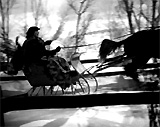


Sleigh-Riding Sequence - Ending with Iris-Out Effect

Eugene's Dinner-Table Speech About the Invention
of the Automobile

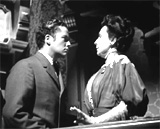
On the Staircase: George and Aunt Fanny

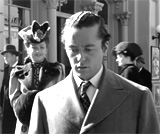
Promenade: Goodbye Scene Between George and Lucy

Death of Major Amberson



Aunt Fanny's Nervous Breakdown with George Next
to Inoperative Boiler ("It's not hot, it's cold")
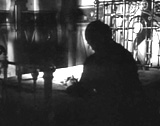
George Kneeling at His Mother's Empty Bedside -
He Had Finally Received His "Come-Uppance"
|


















